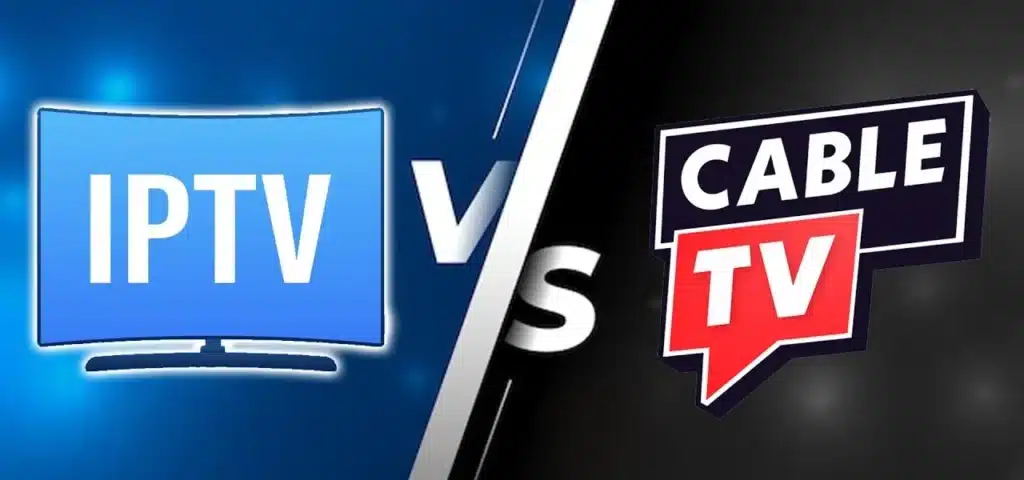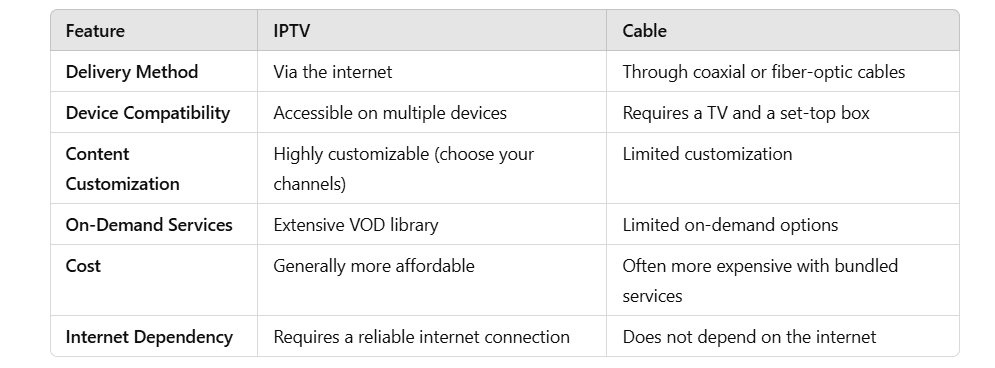IPTV vs Cable: Which One is Right for You?
When it comes to watching television, the options available today are more diverse than ever before. Traditional cable TV, which has been the go-to choice for decades, now faces competition from modern alternatives like IPTV (Internet Protocol Television). But how do these two options compare, and which one is the better fit for your needs? Let’s dive into the key differences, advantages, and potential drawbacks of both IPTV and cable to help you make an informed decision.

What is IPTV?
IPTV, or Internet Protocol Television, delivers TV content through the Internet rather than traditional broadcast methods like satellite or cable. This allows users to access live TV, on-demand movies and shows via devices like smart TVs, smartphones, tablets, and even laptops.
Key Features of IPTV:
- Watch content on multiple devices with an internet connection.
- Customize your subscription to include only the channels you want.
- Enjoy features like pausing, rewinding, and recording live TV.
What is Cable TV?
Cable TV, on the other hand, uses coaxial cables to deliver television programming. It has long been a staple in households and is known for its wide range of channels and reliability.
Key Features of Cable TV:
- Offers a variety of local, national, and premium channels.
- Doesn’t rely on an internet connection, ensuring stable service.
- Typically includes bundled packages with internet and phone services.
Key Differences Between IPTV and Cable
Understanding how IPTV and cable differ is crucial to deciding which one suits you best. Here’s a breakdown of the main distinctions:

Advantages of IPTV
Switching to IPTV offers several benefits:
- Flexibility: You can stream on any device, whether you’re at home or on the go.
- Cost-Effectiveness: IPTV subscriptions often cost less than cable plans, especially if you only pay for the content you need.
- On-Demand Content: Access to a massive library of movies and shows ensures you’ll never run out of entertainment options.
- Interactive Features: Pause, rewind, or fast-forward live TV with ease.
Moreover, IPTV often includes international channels, making it an ideal choice for expats or those seeking global content.
Advantages of Cable TV
Despite IPTV’s growing popularity, cable TV still holds its ground for several reasons:
- Reliability: Since cable doesn’t rely on the internet, it’s unaffected by connectivity issues or slow internet speeds.
- Ease of Use: Cable TV is straightforward, with no need for additional apps or devices.
- Bundled Services: Many providers offer cable TV as part of a bundle with internet and phone services, simplifying billing and saving money.
- Local Channels: Cable ensures access to local news, sports, and events.
For households in areas with poor internet connectivity, cable remains a dependable option.
IPTV vs Cable: Which One is Right for You?
To determine whether IPTV or cable is better suited to your needs, consider the following factors:
Internet Connection:
If you have a fast and reliable internet connection, IPTV might be the better choice. However, if internet speeds in your area are inconsistent, cable offers a more reliable alternative.Budget:
IPTV is typically more affordable, especially if you prefer à la carte channel subscriptions. On the other hand, cable can be costlier due to bundled packages and additional fees.Viewing Habits:
Are you someone who loves on-demand content and flexibility? Then IPTV’s features, like streaming across devices and a vast content library, will appeal to you. If you prefer a straightforward TV experience with minimal setup, cable might be the way to go.Device Compatibility:
IPTV supports a wide range of devices, making it ideal for tech-savvy users. Cable, meanwhile, is limited to TVs equipped with a set-top box.
Transitioning from Cable to IPTV
If you’re currently a cable user and are curious about switching to IPTV, the process is simpler than you might think:
- Choose a Reliable IPTV Provider: Look for providers with good reviews, flexible plans, and reliable service.
- Check Your Internet Connection: Ensure your internet speed is sufficient for streaming high-quality content.
- Select the Right Plan: Many IPTV services allow you to customize your subscription to include only the channels you need.
With these steps, you’ll be ready to enjoy the benefits of IPTV in no time.
Final Thoughts
The choice between IPTV and cable ultimately depends on your lifestyle, budget, and viewing preferences. IPTV offers unmatched flexibility, cost savings, and a modern approach to entertainment, making it the go-to option for tech-savvy and on-the-go users. On the other hand, cable TV remains a solid choice for those who value reliability, simplicity, and bundled services.
Whichever you choose, the key is finding a provider that delivers the best value for your money while meeting your entertainment needs. Take the time to evaluate your options, and enjoy a seamless viewing experience tailored to your preferences!

